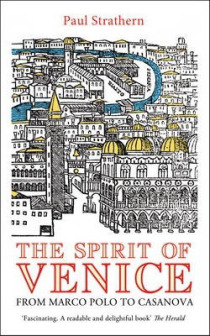With many of us dreaming about foreign shores, it seems on the face of it that The Spirit of Venice: From Marco Polo to Casanova offers a myriad of information to the discerning traveller. Strathern outlines in his introduction that he has attempted to describe Venice’s most famous inhabitants ‘against the background of events that over the centuries forged and finally destroyed the most powerful of all Mediterranean cities’.
 Its premise is fascinating, but sadly it does not always deliver. Its introduction is incredibly short and only covers two printed pages. Whilst it is informative on the whole, there is no real reasoning which Strathern gives for wanting to undertake such a project, which is a shame as such a personal addition would have been a nice touch to the volume. The book has been split into four separate sections – ‘Expansion’, ‘The Imperial Age’, ‘The Long Decline’ and ‘Dissolution and Fall’, and it begins in 1295 with Marco Polo. Strathern has used quotes from additional sources throughout, ranging from the thoughts of Marco Polo and the unnamed ‘man to whom Polo would one day dictate the story of his travels’, to Byzantine Emperor John VI Cantacuzenus and Dante Alighieri.
Its premise is fascinating, but sadly it does not always deliver. Its introduction is incredibly short and only covers two printed pages. Whilst it is informative on the whole, there is no real reasoning which Strathern gives for wanting to undertake such a project, which is a shame as such a personal addition would have been a nice touch to the volume. The book has been split into four separate sections – ‘Expansion’, ‘The Imperial Age’, ‘The Long Decline’ and ‘Dissolution and Fall’, and it begins in 1295 with Marco Polo. Strathern has used quotes from additional sources throughout, ranging from the thoughts of Marco Polo and the unnamed ‘man to whom Polo would one day dictate the story of his travels’, to Byzantine Emperor John VI Cantacuzenus and Dante Alighieri.
The historical background of Venice is set out well, and Strathern features early cases of germ warfare, slavery, a dearth of manpower in fields and homes, the doges of Venice, Cretan rebellions and travel in and out of the city. The overriding focus in the book, however, is upon battles, warfare and the use of the Navy. Whilst this is evidently important in terms of Venice as a whole, this aspect feels rather overdone. In rather an ironic consequence, The Spirit of Venice does not present the spirit of the city as well as it could.
Whilst The Spirit of Venice is an interesting volume for the most part, it feels overly academic in its style, and is rather bogged down in small details, some of which do not hold much importance in the grand scheme of things. The writing can feel dense, and at times the reader has to wade through its pages. Sadly it is rather a weighty tome and is probably not the easiest book to cart around with you whilst on your trip, but it is one which can be dipped into beforehand. As far as history books pertaining to Venice go, this is rather interesting at times, but there must be far more accessible tomes ot there, which may even be lightweight enough to take with you on your travels.
Purchase from The Book Depository
Advertisements Share this:





